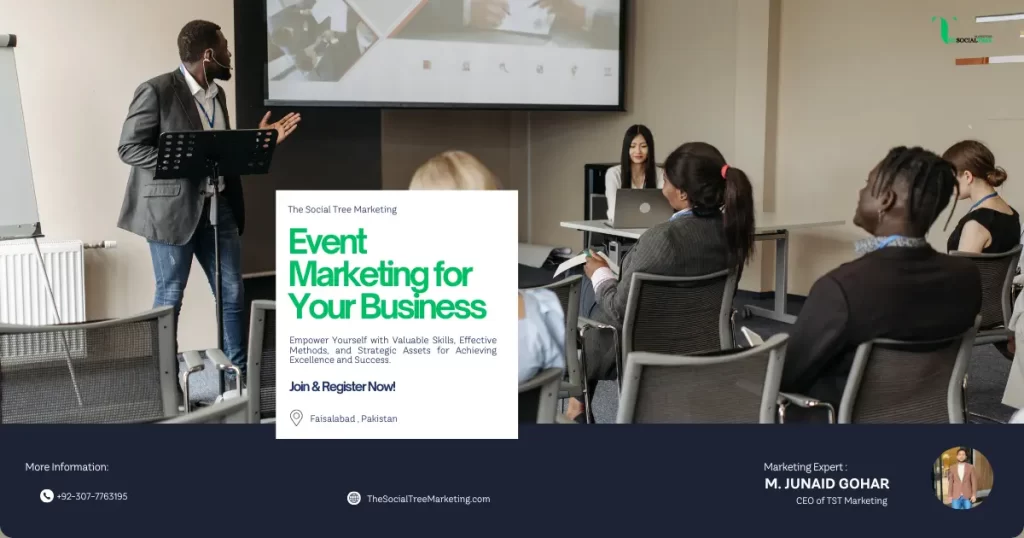Since ancient times, people have gathered to commemorate, exchange ideas, and establish connections. These meetings have developed into what we now call events. Moreover, in this era of digitalization, these events play a crucial role in marketing strategies globally.
Table of Contents
ToggleWhat is Event Marketing
The strategic publicity of a brand, product, or service that is performed through direct interactions is called event marketing. In other words, event marketing is a marketing strategy achieved through live experiences. Additionally, event marketing creates catchy moments that leave long-lasting impressions on attendees.
Types of Event Marketing
There are different types of event marketing. Each type provides different opportunities for businesses or companies to connect with their target audience. Now, for a deeper understanding, let’s elaborate on its types one by one
- Conferences and Seminars
- Trade shows and Exhibitions
- Product Launches
- Experiential Marketing
1- Conferences and Seminars
These events inform attendees about a particular thing, a product, service, or industrial knowledge. They usually feature public speakers and workshops where industry experts share their ideas and perceptions. These events are used to attract a knowledgeable audience.
Furthermore, this type of event provides beneficial opportunities for audiences to engage with fellows and learn from experts in their field. Seminars and conferences are perfect for businesses looking to position themselves as thought heads. In paid perspective, make social marketing strategies to boost your seminars.
2- Trade Shows and Exhibitions
Large-scale events like trade shows and exhibitions are helpful for companies and also for effective publicity. Through trade shows and exhibitions brands display their products, services, and revolutions to a targeted audience.
Moreover, in the exhibitions, there are plenty of different stalls set up by exhibitors to showcase their offerings, connect with people, and generate more leads. Trade shows are also helpful in conducting market research and brand exposure.
3- Product Launches
Product launches are the events where brands proclaim new products or services to the people. These events create gossip and eagerness around the new or incoming offerings.
In addition, product launch events are powerful marketing campaigns. The purpose of these campaigns is to spread brand awareness. With the help of product launches, companies generate more leads and identify their target people.
4- Experiential Marketing
Experiential marketing emphasizes captivating consumers directly. You can create memorable brand experiences through experimental marketing. Experiential marketing is similar to Relationship marketing.
Experiential marketing creates captivating experiences that enable people to interact with a brand in good manners. Moreover, experiential marketing motivates active participation. On the other hand, traditional marketing methods rely on the passive consumption of messaging.
Furthermore, experiential marketing focuses on calling up emotions, sparking conversations, and building personal connections between customers and brands. Experimental marketing also helps create experiences that match people and leave a long-lasting impression. impression.
How does event marketing work?
Event marketing commences with proper planning and strategies. In event marketing, businesses recognize their target audience, set objectives, and select the appropriate type of event. Moreover, publicity through multiple channels helps to get the attention of people. Good Social Media Marketing Strategies can be beneicial. For a deeper understanding of this topic, the workings of event marketing are discussed below:
- Planning: Companies start by recognizing their target people and marketing goals. Marketers determine the type of event that suits their objectives, even a trade show, conference, or product launch.
- Preparation: Once the type of event is confirmed, marketers start preparing for that event. They create promotional material, such as invitations, banners, etc. Moreover, companies may fix sponsorships, set out booths, and correlate with sellers for any service.
- Convertible Engagement: Effective event marketing depends on interactive engagement with visitors. Companies appreciate interactions with the help of different activities like giveaways, contests, or games.
- Use of multiple channels: Businesses may use different communication channels or other social media platforms to cover their events. This coverage can increase brand awareness and visibility as well.
In brief, event marketing is an effective way for brands to engage with their target audience directly and achieve desired goals by following the above steps carefully.
Benefits of Event Marketing
Event marketing offers numerous benefits. It can provide direct engagement with customers, enhance brand awareness, and bring in more leads. An explanation of these benefits is given below:
1- Direct Engagement
Events provide opportunities for direct interactions between brands and their customers. Furthermore, events enable instantaneous conversations and personal connections. Unlike traditional marketing, where communication is one way, people use online platforms to convey their thoughts effectively.
2- Brand Awareness
Event marketing is an effective strategy that introduces your brand to a target area or worldwide. The Brand Awareness Campaigns improve brand image and visibility among attendees. It leaves a lasting and positive impression on attendees. Besides, it can create memorable experiences. Additionally, event marketing can cause gossip and entertainment as well. Click to learn more about brand awareness campaign strategy.
3- Lead Generations
Events work as productive land for lead generation and customer addition. Attendees can be captured as leads by gathering contact information through registration forms and other means. These events also help in establishing relationships and trust. Furthermore, it enhances the likelihood of conversions.
Conclusion:
Event marketing is an effective strategy that is employed by businesses to engage with their target audience. Event marketing can also spread brand awareness, and drive sales. Brands can leave a long-lasting impression on attendees and achieve their goals successfully by creating memorable experiences. Event marketing also opens doors to new opportunities.
Reference:
For general overview, you can consider wikipedia.

